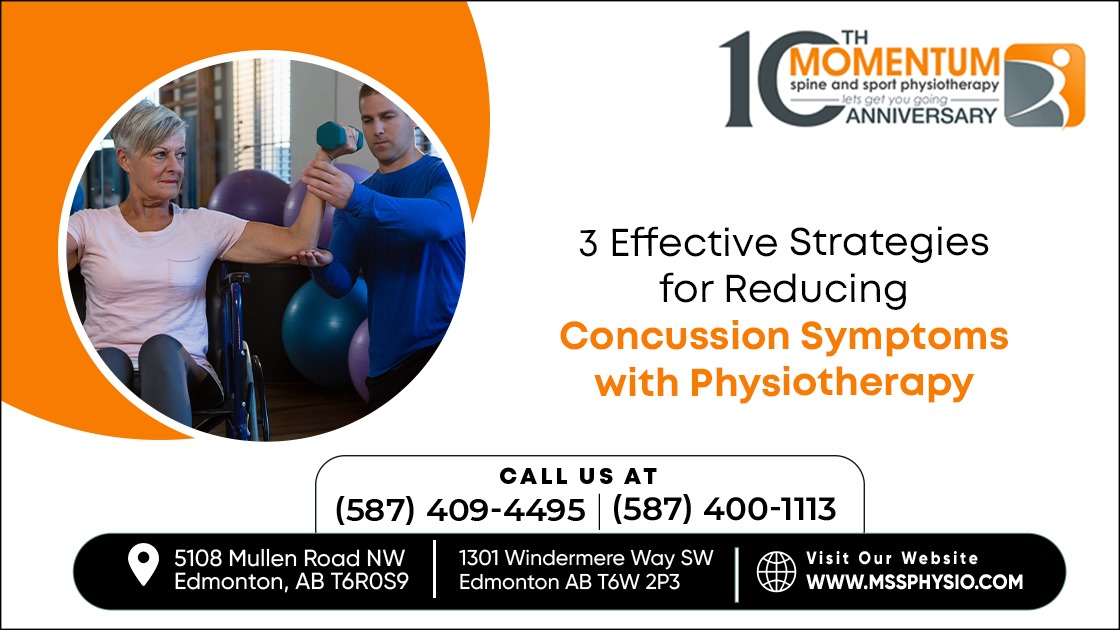Concussions are complex injuries that can lead to a range of persistent symptoms, from headaches and dizziness to cognitive disturbances. In Windermere, individuals seeking relief from these symptoms can benefit from specialized concussion physiotherapy. This approach to concussion management involves tailored strategies that not only aim to alleviate the immediate effects of the injury but also promote long-term recovery.
Concussion physiotherapy in Edmonton focuses on a holistic treatment plan that includes exercises to restore balance, techniques to reduce headaches, and therapies designed to improve cognitive function. By addressing concussion symptoms comprehensively, physiotherapy plays a crucial role in helping patients regain their normal lifestyle more quickly and safely.
Here are three effective strategies used in concussion physiotherapy in Windermere:
1. Vestibular Rehabilitation Therapy (VRT)
Vestibular rehabilitation therapy focuses on addressing balance issues and dizziness that are common after a concussion. This specialized form of therapy helps retrain the brain and body to compensate for changes in the vestibular system.
Balance Training
These are exercises designed to improve balance and reduce dizziness. Activities include standing on one leg, walking on uneven surfaces, or using balance boards.
How to Perform Single-Leg Stand:
Stand next to a stable object, like a sturdy chair or counter for support. Lift one foot off the ground and try to maintain balance on the standing leg. Hold this position for 10-30 seconds. Alternate legs and repeat the exercise 2-3 times on each leg daily. As balance improves, try performing the exercise without holding onto support.
Gaze Stabilization
These techniques improve control of eye movements and reduce symptoms like dizziness and visual disturbances.
How to Perform VOR (Vestibulo-Ocular Reflex) Training:
Sit or stand in a comfortable position. Focus on a stable object at eye level. Move the head from side to side while keeping the eyes fixed on the object. Start with slow movements and slowly increase speed as tolerated. Perform for 1-2 minutes several times a day.
Habituation Exercises
These involve repeated exposure to movements or environments that trigger symptoms, helping the brain adapt and reduce symptom severity over time.
How to Perform Head Movements:
Sit or stand comfortably. Move the head in different directions (side to side, up and down) to trigger mild dizziness. Begin with slow, small movements. Perform for 5-10 minutes, 2-3 times a day. Slowly increase the speed and range of motion as tolerance improves.
2. Cervicogenic Treatment
Concussions can also cause or exacerbate neck pain and dysfunction, contributing to headaches and dizziness. Cervicogenic treatment addresses issues related to the cervical spine.
Manual Therapy
Physiotherapists use hands-on techniques to improve neck mobility, reduce muscle tension, and alleviate pain.
Joint Mobilization
The therapist gently moves the joints of the cervical spine through their natural range of motion, applying pressure in specific directions to stretch the joint capsule and reduce stiffness. This is typically performed for several minutes during a session, depending on the patient’s condition.
Soft Tissue Massage
The therapist uses various massage techniques, such as kneading and rolling, to target the muscles around the neck and shoulders, releasing muscle knots and improving blood flow. This is usually integrated into the therapy session, focusing on areas of tightness for a few minutes.
Strengthening Exercises
Targeted exercises strengthen the neck and shoulder muscles, providing better support for the head and reducing the risk of further injury.
How to Perform Chin Tucks:
Sit or stand with a straight back. Gently pull the chin back, creating a double chin effect without tilting the head forward or backward. Hold for 5-10 seconds, then relax. Perform 10-15 repetitions, 2-3 times a day.
Postural Education
Guidance on maintaining proper posture to reduce strain on the neck and enhance overall spinal alignment.
What is Educated:
Ergonomic advice includes instructions on setting up a workspace to minimize neck strain, such as adjusting the height of a computer screen and using a supportive chair. Tips for maintaining good posture during day-to-day activities, such as sitting, standing, and sleeping, are also provided.
How to Implement:
During work, keep the monitor at eye level, sit with the back supported, and take regular breaks to stand and stretch. In daily life, use supportive pillows, avoid slouching, and maintain a neutral spine position while standing or walking.
3. Cognitive Rehabilitation Therapy (CRT)
Cognitive rehabilitation therapy addresses cognitive deficits such as memory loss, attention issues, and difficulty with problem-solving often associated with concussions. This therapy involves exercises and activities designed to improve cognitive functions and help patients return to their daily routines.
Memory Exercises
These exercises help improve short-term and long-term memory.
How to Perform
Use memory games, puzzles, or apps designed to enhance memory function. Engage in these activities for 15-20 minutes, 3-4 times a week.
Attention Training
These exercises are aimed at improving focus and attention span.
How to Perform
Choose activities that require sustained attention, such as reading, playing attention-based games, or engaging in mindful meditation. Start with short sessions (5-10 minutes) and gradually increase the duration.
Problem-Solving Tasks
These activities are designed to enhance critical thinking and problem-solving skills.
How to Perform
Use puzzles, strategy games, or real-life problem-solving scenarios. Work on these tasks for 10-15 minutes several times a week, progressively increasing the difficulty level.
By incorporating these strategies, concussion physiotherapy in Windermere can effectively reduce concussion symptoms, aiding in a quicker and more comprehensive recovery.
Enhancing Recovery from Concussions with Physiotherapy
In conclusion, managing concussion symptoms effectively requires targeted approaches that address both the physical and cognitive aspects of recovery. At Momentum Physiotherapy in Windermere, the focus is on concussion physiotherapy, which provides patients with the tools and treatments necessary for effective concussion management. This therapeutic approach is designed to reduce symptoms, promote healing, and accelerate the return to daily activities safely and efficiently.
Contact us at +1(587)-400-1113 or visit www.mssphysio.com to learn more about how our concussion physiotherapy in Windermere can help you or your loved one recover fully and regain optimal health




